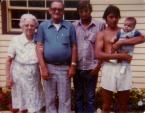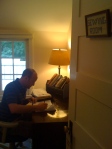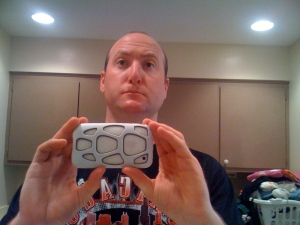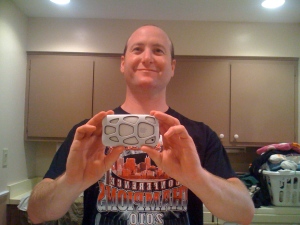By: Michael J. Greenwald
Good Morning, Sleep Sunshine Devotees!
This excerpt from my novel, The Rainbow Child, was created from a prompt on StoryStudio Chicago’s webzine Cooler By The Lake. “Weekend Words 11/5/10.”
Prompt #1 – “Meet The ‘Rents”
Growing up had been an odd period for Zophie. Her mother was a sad, quiet woman, prone to spending long-hours in her garden in the summer and in her room throughout the winter. She had an unnerving habit of humming for long stretches; nothing catchy, nothing known, songs she’d made up in her head—Zophie’s ealiest musical influence. The humming went on incessantly, speaking was another matter. Zophie’s mother Grace could spend weeks not saying a thing. She’d stand in the kitchen filling a tea kettle with water and become lost staring out the window. If not for Zophie breaking the trance by pointing out the fullness of the tea kettle (truth be told it had been full for the last ten minutes) Grace might have stood there while winter turned to spring and then summer.
 One factor which had motivated her to leave her hometown as soon as she could had been a recurring dream she’d had from fifteen years old until she’d been in California for over a year. In the dream she found herself in the kitchen prone over her mother with her hands (in the dream she had the full use of both) wrapped around her mother’s neck, strangling the woman. For her part her mother didn’t resist, and in fact, appeared, with her smoky grey eyes to be encouraging her youngest daughter’s action.
One factor which had motivated her to leave her hometown as soon as she could had been a recurring dream she’d had from fifteen years old until she’d been in California for over a year. In the dream she found herself in the kitchen prone over her mother with her hands (in the dream she had the full use of both) wrapped around her mother’s neck, strangling the woman. For her part her mother didn’t resist, and in fact, appeared, with her smoky grey eyes to be encouraging her youngest daughter’s action.
The dream never quit, either.
From fifteen until she’d been in California for over a year, she’d wake up in the darkness with the sense that both her hands were flexed, though when she flipped on her bedside lamp she’d discovered her right hand squeezed into a claw while the stub on her other arm remained the same—yet a feeling of phantom fingers squeezed around pale flesh was present. Waking alone in her childhood room had been one thing, but once Annie and she had rented the apartment on Telegraph Avenue above the Korean Grocery and Zophie would jerk up in the bed they shared, hands raised above her face as though she were raising a beam; startling Fred, their labrador retriever, sufficiently enough where he’d begin howling and wake Annie up beside her, Zophie found sleeping on the pull-out in their study necessary. Which only served to be Hell on she and Annie’s intimacy and Zophie’s bad back.
 The dream had been disturbing enough, but when she’d lived at her parent’s house she discovered one day it had leaked into her consciousness and this frightened her enough to cement the belief escaping Worthington was her only solution. She’d been sitting at the kitchen table, doing her math or science homework, using the adding machine her mother, when well enough, employed at the end of each month to tally the household bills and expenses. She heard the running faucet and after moment looked up, pencil tip frozen in the upper loop of a half-finished “8” and realized the water hadn’t just been running for a moment—she’d finished the better part of five algebra worksheets and even through her intense focus (because unlike English, math did not come easily) she’d faintly heard the sound of water crashing throughout. Zophie lifted her pencil and looked up. Shoulder bones sticking out against the tattered, discolored material of her ratty robe, Grace stood at the kitchen sink, filling a tea kettle. Water bubbled like a geyser out of the kettle, filled to capacity. When Zophie rose and tapped Grace on the shoulder, told her the kettle was full, her mother looked at her with those smoky grey eyes for a long moment before squeezing the stainless steel level in her tiny hand and pushing down. Not one fiber of Grace’s facial tissue changed, no smile, no frown—her mother said not one word, yet when Zophie turned around she found it difficult to locate herself back to the chair. The short space from sink to kitchen table blurred in her vision, her thigh and calf muscles shook as though she’d undertook a ten-mile-hike. She clamped her hand on the table-top in order to not go down. She turned her head to the sound of crashing water and observed her mother holding the tea kettle under the sink faucet, staring out the window. Zophie felt felt stoned and stupid. A crushing need to go lie down overcame her, but she knew her dizziness and jelly legs wouldn’t propel her from the kitchen. In her mind, all she could focus on, all she could think, was something that would never leave her (even now, in the kitchen, she shivered, turning over the meat). The feeling of that moment when an irrational thought, something originated in a dream world, became a rational real world belief. And it stunned her, immobilized her. Cause she knew without a doubt that something in the expressionlessness of her mother’s face and a sudden bluish flash of her retinas had been Grace pleading for her youngest daughter to wrap her hands around her porcelain neck, pull her withered body to the filthy tile floor and crush her larynx—extinguishing whatever little life her mother had left.
The dream had been disturbing enough, but when she’d lived at her parent’s house she discovered one day it had leaked into her consciousness and this frightened her enough to cement the belief escaping Worthington was her only solution. She’d been sitting at the kitchen table, doing her math or science homework, using the adding machine her mother, when well enough, employed at the end of each month to tally the household bills and expenses. She heard the running faucet and after moment looked up, pencil tip frozen in the upper loop of a half-finished “8” and realized the water hadn’t just been running for a moment—she’d finished the better part of five algebra worksheets and even through her intense focus (because unlike English, math did not come easily) she’d faintly heard the sound of water crashing throughout. Zophie lifted her pencil and looked up. Shoulder bones sticking out against the tattered, discolored material of her ratty robe, Grace stood at the kitchen sink, filling a tea kettle. Water bubbled like a geyser out of the kettle, filled to capacity. When Zophie rose and tapped Grace on the shoulder, told her the kettle was full, her mother looked at her with those smoky grey eyes for a long moment before squeezing the stainless steel level in her tiny hand and pushing down. Not one fiber of Grace’s facial tissue changed, no smile, no frown—her mother said not one word, yet when Zophie turned around she found it difficult to locate herself back to the chair. The short space from sink to kitchen table blurred in her vision, her thigh and calf muscles shook as though she’d undertook a ten-mile-hike. She clamped her hand on the table-top in order to not go down. She turned her head to the sound of crashing water and observed her mother holding the tea kettle under the sink faucet, staring out the window. Zophie felt felt stoned and stupid. A crushing need to go lie down overcame her, but she knew her dizziness and jelly legs wouldn’t propel her from the kitchen. In her mind, all she could focus on, all she could think, was something that would never leave her (even now, in the kitchen, she shivered, turning over the meat). The feeling of that moment when an irrational thought, something originated in a dream world, became a rational real world belief. And it stunned her, immobilized her. Cause she knew without a doubt that something in the expressionlessness of her mother’s face and a sudden bluish flash of her retinas had been Grace pleading for her youngest daughter to wrap her hands around her porcelain neck, pull her withered body to the filthy tile floor and crush her larynx—extinguishing whatever little life her mother had left.



































